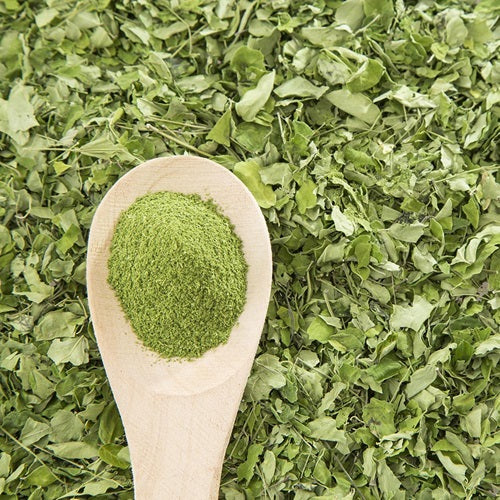Menu
Add description, images, menus and links to your mega menu
A column with no settings can be used as a spacer
Link to your collections, sales and even external links
Add up to five columns
Add description, images, menus and links to your mega menu
A column with no settings can be used as a spacer
Link to your collections, sales and even external links
Add up to five columns
LOOKING FOR BULK INGREDIENTS PRICING?

Benefits of Moringa Powder - Wholesale B2B Bulk Suppliers
Sustainable Farming and the Environmental Impact of Moringa Powder
Sustainable farming is the need of the hour as the world faces pressing challenges like climate change, soil degradation, and resource depletion. In recent years, there has been a growing interest in plants that offer both health benefits and the potential for sustainable agriculture. One such plant is Moringa oleifera, commonly known as the "drumstick tree" or "miracle tree." Moringa powder, made from dried Moringa leaves, is packed with nutrients and antioxidants, making it a popular supplement worldwide. But beyond its health benefits, the environmental impact of cultivating and producing Moringa powder deserves attention. In this blog, we’ll explore sustainable farming practices related to Moringa cultivation and assess its environmental footprint.
What is Sustainable Farming?
Sustainable farming refers to agricultural practices that prioritize long-term ecological health, economic viability, and social equity. It aims to produce food and resources while reducing environmental impact, conserving biodiversity, and preserving the quality of soil and water for future generations. Techniques often employed include crop rotation, organic farming, water conservation, reduced use of chemical inputs, and integrated pest management.
The Moringa Tree: A Powerhouse of Sustainability
Moringa has earned its place in sustainable farming due to several key factors:
- Low Water Requirement: One of the major challenges in modern agriculture is the excessive use of water. Moringa, however, is highly drought-tolerant, thriving in arid and semi-arid regions with minimal irrigation. This makes it an excellent crop for areas facing water scarcity.
- Fast Growth: Moringa is a fast-growing tree that can reach up to 12 meters in height. Its leaves can be harvested within 6 months of planting, and the tree continues to produce for years. This rapid growth provides farmers with a continuous source of nutrition and income.
- Nutrient-Rich and Versatile: Moringa leaves are highly nutritious, containing essential vitamins, minerals, and amino acids. The powder made from dried leaves is used in supplements and food products, contributing to food security and reducing malnutrition in developing regions.
- Soil Enrichment: Moringa helps restore soil health by replenishing nutrients. Its deep roots prevent soil erosion and improve the soil's capacity to retain moisture, making it an excellent crop for combating desertification.
- Low Maintenance: Moringa requires minimal use of fertilizers or pesticides. Its natural resistance to pests reduces the need for harmful chemical inputs, promoting a healthier ecosystem.
Environmental Impact of Moringa Powder Production:
While Moringa farming is sustainable in many ways, the production and commercialization of Moringa powder have their own environmental considerations.
- Energy Use in Processing: The process of drying and powdering Moringa leaves requires energy. However, with efficient, low-energy technologies such as solar drying, the environmental footprint can be significantly reduced. Using renewable energy sources for processing would make the production even more sustainable.
- Packaging and Transportation: As Moringa powder becomes more popular globally, the environmental impact of packaging and transportation comes into play. Many commercial products use single-use plastic packaging, which contributes to plastic waste. Moreover, the carbon footprint of shipping Moringa powder from regions like South Asia or Africa to Western markets needs to be considered. Sustainable packaging solutions and local production initiatives can mitigate this impact.
- Potential for Monoculture: While Moringa has numerous environmental benefits, large-scale monoculture farming of any crop can pose risks to biodiversity. Encouraging diversified farming practices, including intercropping with other species, can help maintain ecological balance.
- Fair Trade and Ethical Practices: Sustainable farming is not only about environmental impact but also about fair labor practices and community support. Ensuring that Moringa is sourced from small-scale farmers who practice ethical farming and receive fair compensation is essential for a truly sustainable Moringa industry.
Conclusion: Moringa as a Model for Sustainable Agriculture
Moringa farming aligns with many principles of sustainable agriculture. Its low resource requirements, ability to enhance soil health, and contributions to food security make it a valuable crop for addressing environmental and nutritional challenges. However, as the demand for Moringa powder grows, it is crucial to adopt sustainable practices across the entire production chain—from cultivation to packaging and distribution.
By supporting local farmers, investing in energy-efficient processing methods, and encouraging eco-friendly packaging, Moringa powder can continue to thrive as an environmentally friendly superfood with minimal negative impact on the planet. Sustainable farming practices paired with conscious consumption will ensure that this "miracle tree" benefits both people and the planet for generations to come.
For bulk orders and inquiries, visit: Reveda Moringa Powder
BUY ONLINE IN USA FROM REVEDA - The leading manufacturer B2B Bulk Wholesale Supplier of Moringa Leaf Powder
Also in Reveda: Health & Wellness

Benifits Of Omega-3 Fish Oil EE - 460 MG/G EPA & 180 MG/G DHA - Wholesale B2B Bulk Suppliers in USA
Read More
SUBSCRIBE NOW ...
Don't miss to get latest updates on sales, new releases and promotions

